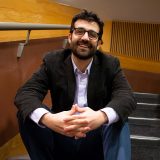Bruno Carvalho
Co-Director of the Harvard Mellon Urban Initiative, Professor of Romance Languages and Literatures, and Faculty Affiliate in Urban Planning and Design at Harvard University
Presentation:
“From the Embodied to the Planetary: Scales of Belonging in Burle Marx’s Brazil”
Between the 1940s and the 1970s Brazil underwent a period of major infrastructure construction and urbanization. Various projects were conceived with regional and continental scales in mind. The new capital of Brasília, for example, played a role in the integration of the Amazonian region to major metropolitan centers in the Southeast. In this broader context, Burle Marx’s landscape architecture stands apart for mobilizing a different set of forms of being and belonging, which included embodied scales (bodies, plants) as well as the planetary (earth systems, ecologies). In a contemporary moment when authoritarians have been making successful appeals to a sense of belonging to the idea of a nation, rather than to a place, how can Burle Marx’s work help us to articulate alternate forms of belonging grounded on the territorial (cities, ecosystems) rather than on more abstract modes of identity?
Bruno Carvalho is Professor of Romance Languages and Literatures and African and African American Studies at Harvard University, Affiliate Professor at the Graduate School of Design, and co-Director of the Harvard Mellon Urban Initiative. His research and teaching interests range from the early modern period to the present, and include literature, culture, and the built environment, with a focus on Brazil. He has published widely on topics related to poetry, film, architecture, cartography, city planning, environmental justice, race, and racism. A Rio de Janeiro native, Carvalho previously taught at Princeton University (2009–2018). His Porous City: A Cultural History of Rio de Janeiro (2013) won the Brazilian Studies Association Roberto Reis Book Award in 2014. Carvalho is co-editor of publications like Occupy All Streets: Olympic Urbanism and Contested Futures in Rio de Janeiro (2016) and Essays on Hilda Hilst: Between Brazil and World Literature (2018).



